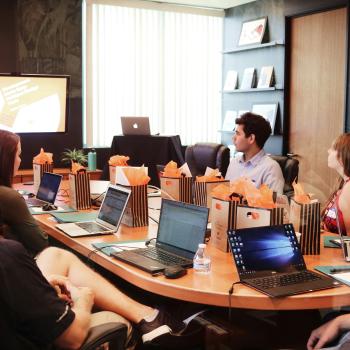
In our digital era, the ability to offer hybrid or fully remote roles is not just a perk – it’s a strategic necessity. But the impact goes beyond just staffing strategies. This shift towards more flexible arrangements is a profound expression of trust, a signal to employees that their autonomy is respected and valued. This is the culture at Cambia Health Solutions, as revealed in my insightful conversation with Elizabeth Cole, the CHRO of this pioneering healthcare insurance company. Together, we unraveled the often-invisible threads that hold together the fabric of successful flexible work.
The Genesis of Remote Work at Cambia
Cambia Health Solutions was already familiar with flexible work before COVID-19 transformed the workplace. Operating across Oregon, Washington, Idaho, and Utah, Cambia has had a large portion of its organization working remotely for years.
This foresight ensured that a substantial segment of their employees, from the dynamic voices at the call centers to the analytical minds of actuaries and underwriters, were already adept at working outside the traditional office. As the pandemic reshaped our perception of work, Cambia seamlessly transitioned to a hybrid work model for most of its staff, setting the stage for a broader conversation on finding the perfect equilibrium between office presence and remote freedom.
The Benefits of Flexibility: A New Competitive Edge
By offering flexible arrangements, Cambia has unlocked a powerful tool for both recruitment and retention. Cole emphasized this point, illustrating how Cambia’s embrace of a hybrid work model has transformed it into a formidable player in the competitive landscape.
By giving staff flexibility in their work environment, Cambia has tapped into a deeper level of employee satisfaction. This autonomy can enhance overall happiness for some employees, but Cole cautions that autonomy without purposeful connections can lead to feelings of loneliness and isolation from other colleagues.
Additionally, the flexibility of hybrid work brings tangible benefits to productivity. Employees can seamlessly integrate various facets of their lives, balancing work with personal responsibilities. This integration naturally leads to reduced stress levels and the elimination of time-consuming commutes. However, as Cole wisely notes, this increase in productivity isn’t a one-size-fits-all scenario. The effectiveness of remote work can vary dramatically depending on the specific arrangement and the nature of the work involved.
Measuring Productivity and Performance: A Results-Oriented Approach
Cambia’s strategy for measuring productivity and performance in its workforce is a paradigm shift from the traditional office model. Cole highlighted the company’s focus on outcomes. This approach represents a departure from the outdated practice of physical supervision, where employee productivity was often equated with their presence in the office.
By prioritizing results over time spent at a desk, Cambia fosters an environment where creativity and problem-solving are at the forefront. This model encourages employees to think outside the box, offering them the freedom to approach tasks in ways that best suit their skills and working styles. It’s a recognition that value creation doesn’t necessarily align with time spent, but rather with the quality and impact of the work produced. This results-oriented approach not only boosts efficiency but also empowers employees, giving them a sense of ownership and responsibility for their projects.
Tackling the Challenges of Remote Work: Onboarding and Mentoring
Navigating the nuances of a hybrid work model, especially when it comes to integrating new employees, is a challenge Cambia is actively addressing. The onboarding process at Cambia goes beyond mere orientation; it’s an exercise in comprehensive business integration. Cole underscored the importance of this process, emphasizing that it’s designed to align new hires with the company’s values, goals, and operational methodologies.
Recognizing the potential disconnect that can occur in remote settings, Cambia places a strong emphasis on the role of supervisors in maintaining personal connections. They are encouraged to frequently engage with their team members, using tools like Microsoft Teams to bridge the physical gap. This approach ensures that new employees feel connected and supported, even when they are not physically in the office.
However, as Cole candidly admits, this is an area of ongoing development. Cambia is actively exploring ways to enhance its remote onboarding and mentoring, acknowledging that the virtual environment poses unique challenges in fostering connections and conveying company culture.
Flexible Work at Cambia: A Balanced Hybrid Model
Cambia is working to strike the perfect balance between remote and in-office work. Cole champions a hybrid model that combines the best of both worlds: the collaboration and energy of in-person interactions with the autonomy and flexibility of remote work.
Cambia employees are encouraged to come into the office for specific tasks that benefit from face-to-face interaction, such as creative brainstorming, strategy sessions, and team-building activities. For other tasks that require deep concentration or individual focus, the option to work remotely is available. This hybrid model, ideally involving two to three days in the office each week, is seen as the optimal arrangement for balancing productivity, employee satisfaction, and the maintenance of a cohesive company culture.
In this model, the office becomes more than just a place to work; it’s a hub for creativity, collaboration, and community building, while the home or any remote location provides a haven for focused, independent work. This balanced approach is what Cole believes is the sweet spot for Cambia, offering a workplace that supports both employee flexibility and the benefits of teamwork.
Cognitive Biases Impacting Remote Work Dynamics
In the context of remote work, certain cognitive biases can significantly influence both management decisions and employee performance. Specifically, let’s delve into how status quo bias and loss aversion play pivotal roles in shaping attitudes and behaviors towards remote work environments.
Status quo bias, which is the preference for the current state of affairs, often leads to resistance against the shift to remote work. This resistance can be observed in both organizational policies and individual attitudes. Organizations accustomed to traditional office settings might undervalue the benefits of remote work, such as increased flexibility and productivity, due to a preference for the familiar.
Loss aversion, the tendency to prioritize avoiding losses over acquiring equivalent gains, significantly influences remote work dynamics. Managers often fear the loss of control and oversight in remote settings, leading to concerns about decreased productivity and a possible inclination towards micromanagement. There is also a general concern about losing the spontaneous interactions and collaborations that occur in physical office spaces, although remote work can foster focused, uninterrupted deep work.
Recognizing and mitigating the impacts of status quo bias and loss aversion can be achieved through strategies such as clear communication of remote work’s benefits and establishing systems to maintain collaboration and innovation. As remote work evolves, navigating these psychological aspects will be key to successful adaptation and implementation.
Conclusion
Trust, flexibility, and an understanding of individual differences are crucial for the success of working remotely. That’s what I found when helping clients figure out their flexible work models, and I was glad to see these same dynamics in Cambia’s approach. Cole highlights the importance of adapting to new work environments while maintaining productivity and employee engagement. This insight provides a valuable lesson for organizations navigating the post-pandemic work landscape. So, are you ready to embrace trust and flexibility in your workforce?
Key Take-Away
Cambia Health Solutions’ hybrid work model demonstrates that flexibility and autonomy in the workplace can significantly enhance employee satisfaction and productivity, underscoring the strategic necessity of adaptable work arrangements…>Click to tweet
Image credit: Anna Shvets/pexels
Originally published in Disaster Avoidance Experts
Dr. Gleb Tsipursky was lauded as “Office Whisperer” and “Hybrid Expert” by The New York Times for helping leaders use hybrid work to improve retention and productivity while cutting costs. He serves as the CEO of the boutique future-of-work consultancy Disaster Avoidance Experts. Dr. Gleb wrote the first book on returning to the office and leading hybrid teams after the pandemic, his best-seller Returning to the Office and Leading Hybrid and Remote Teams: A Manual on Benchmarking to Best Practices for Competitive Advantage (Intentional Insights, 2021). He authored seven books in total, and is best know for his global bestseller, Never Go With Your Gut: How Pioneering Leaders Make the Best Decisions and Avoid Business Disasters (Career Press, 2019). His cutting-edge thought leadership was featured in over 650 articles and 550 interviews in Harvard Business Review, Forbes, Inc. Magazine, USA Today, CBS News, Fox News, Time, Business Insider, Fortune, and elsewhere. His writing was translated into Chinese, Korean, German, Russian, Polish, Spanish, French, and other languages. His expertise comes from over 20 years of consulting, coaching, and speaking and training for Fortune 500 companies from Aflac to Xerox. It also comes from over 15 years in academia as a behavioral scientist, with 8 years as a lecturer at UNC-Chapel Hill and 7 years as a professor at Ohio State. A proud Ukrainian American, Dr. Gleb lives in Columbus, Ohio. In his free time, he makes sure to spend abundant quality time with his wife to avoid his personal life turning into a disaster. Contact him at Gleb[at]DisasterAvoidanceExperts[dot]com, follow him on LinkedIn @dr-gleb-tsipursky, Twitter @gleb_tsipursky, Instagram @dr_gleb_tsipursky, Facebook @DrGlebTsipursky, Medium @dr_gleb_tsipursky, YouTube, and RSS, and get a free copy of the Assessment on Dangerous Judgment Errors in the Workplace by signing up for the free Wise Decision Maker Course at https://disasteravoidanceexperts.com/newsletter/.


















